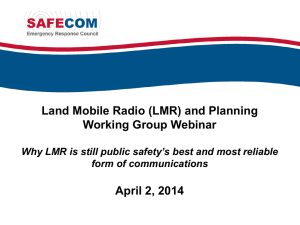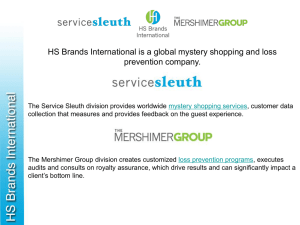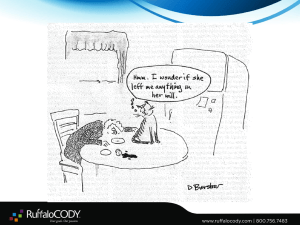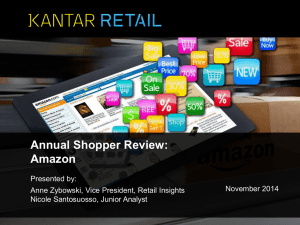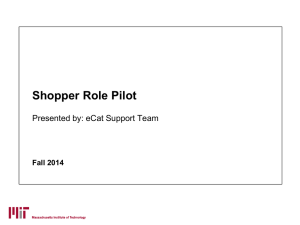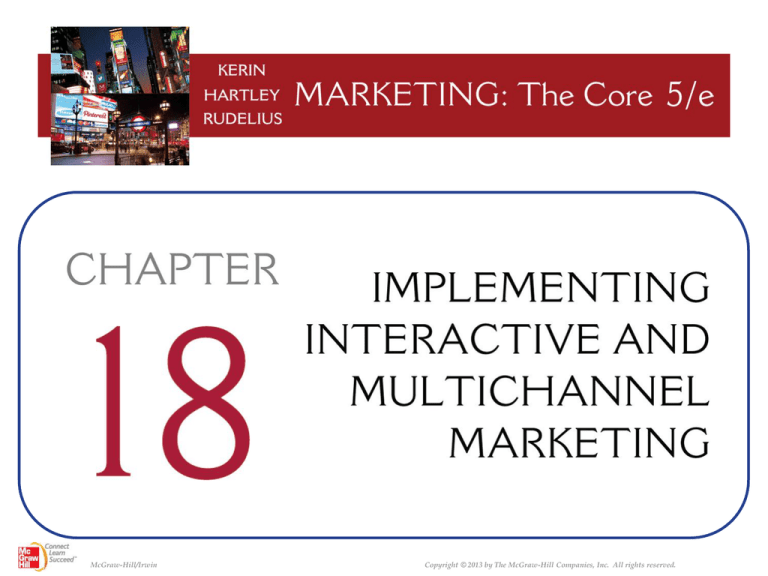
McGraw-Hill/Irwin
Copyright © 2013 by The McGraw-Hill Companies, Inc. All rights reserved.
LEARNING OBJECTIVES (LO)
AFTER READING CHAPTER 18, YOU SHOULD BE ABLE TO:
LO1
LO2
Describe what interactive marketing
is and how it creates customer value,
customer relationships, and customer
experiences.
Explain why certain types of products
and services are particularly suited
for interactive marketing.
18-2
LEARNING OBJECTIVES (LO)
AFTER READING CHAPTER 18, YOU SHOULD BE ABLE TO:
LO3
LO4
Describe why consumers shop and
buy online and how marketers
influence online purchasing behavior.
Define cross-channel shoppers and the
role of transactional and promotional
websites in reaching these shoppers.
18-3
SEVEN CYCLES. ONE BIKE. YOURS.
18-4
CREATING CUSTOMER VALUE, RELATIONSHIPS,
LO1
AND EXPERIENCES IN MARKETSPACE
CUSTOMER VALUE IN MARKETSPACE
Marketplace
Marketspace
• Time Utility
• Possession Utility
• Form Utility
18-5
FIGURE 18-1 Trend in online shoppers and
online retail sales revenue in the U.S.
18-6
FIGURE 18-1A Trend in online shoppers in
the U.S.
18-7
FIGURE 18-1B Trend in online retail sales
revenue in the U.S.
18-8
CREATING CUSTOMER VALUE, RELATIONSHIPS,
LO1
AND EXPERIENCES IN MARKETSPACE
INTERACTIVITY AND INDIVIDUALITY IN MARKETSPACE
Interactivity
Individuality
Interactive Marketing
Choiceboard
M&Ms
• Collaborative Filtering
18-9
CREATING CUSTOMER VALUE, RELATIONSHIPS,
LO1
AND EXPERIENCES IN MARKETSPACE
INTERACTIVITY AND INDIVIDUALITY IN MARKETSPACE
Personalization
Permission Marketing
• Opt-In
• Opt-Out
18-10
FIGURE 18-2 Seven website design
elements that drive customer experience
18-11
CREATING CUSTOMER VALUE, RELATIONSHIPS,
LO1
AND EXPERIENCES IN MARKETSPACE
CREATING AN ONLINE EXPERIENCE
Customer Experience
• Context
Functional
Aesthetic
• Content
• Customization
18-12
CREATING CUSTOMER VALUE, RELATIONSHIPS,
LO1
AND EXPERIENCES IN MARKETSPACE
CREATING AN ONLINE EXPERIENCE
Customer Experience
• Connection
• Communication
• Community
• Commerce
18-13
USING MARKETING DASHBOARDS
LO1
Sizing Up Site Stickiness at
Sewell Automotive Companies
Average Time Spent per Unique Monthly Visitor
×
=
Average Time
Spent per
Unique Monthly
Visitor (minutes)
Average Visits
per Unique
Monthly Visitor
Average Time
Spent per
Visit (minutes)
18-14
LO2
ONLINE CONSUMER BEHAVIOR AND
MARKETING PRACTICE IN MARKETSPACE
WHO IS THE ONLINE CONSUMER?
Online Consumers
Seek Product Information
• Educated
• Affluent
• Young
• Diverse
20% of Those Who Spend $1,000+
per Year Online = 87% of Sales!
18-15
LO2
MARKETING MATTERS
Meet Today’s Internet Mom on a Mission
18-16
LO3
ONLINE CONSUMER BEHAVIOR AND
MARKETING PRACTICE IN MARKETSPACE
WHAT ONLINE CONSUMERS BUY
Product Information
Audio/Video Demos
Digital Items
Unique Items
Convenience Items
Standardized Items
18-17
FIGURE 18-3 Why consumers shop and
buy online
18-18
LO4
ONLINE CONSUMER BEHAVIOR AND
MARKETING PRACTICE IN MARKETSPACE
WHY CONSUMERS SHOP AND BUY ONLINE
Convenience
• Bots
• Eight-Second Rule
Choice
• Offering Selection
• Choice Assistance
18-19
LO4
ONLINE CONSUMER BEHAVIOR AND
MARKETING PRACTICE IN MARKETSPACE
WHY CONSUMERS SHOP AND BUY ONLINE
Customization
• Customerization
Communication
• Marketer-to-Consumer E-mails
• Consumer-to-Marketer Requests
• Chat Rooms, Messaging, Social Networks
18-20
LO4
ONLINE CONSUMER BEHAVIOR AND
MARKETING PRACTICE IN MARKETSPACE
WHY CONSUMERS SHOP AND BUY ONLINE
Communication
• Web Communities
• Blog
• Spam
• CAN-SPAM Act
18-21
LO4
ONLINE CONSUMER BEHAVIOR AND
MARKETING PRACTICE IN MARKETSPACE
WHY CONSUMERS SHOP AND BUY ONLINE
Communication
• Buzz
• Viral Marketing
Frito-Lay
Embed a Message
Create Compelling Content
Offer Incentives
18-22
LO4
ONLINE CONSUMER BEHAVIOR AND
MARKETING PRACTICE IN MARKETSPACE
WHY CONSUMERS SHOP AND BUY ONLINE
Cost
• Dynamic Pricing
Control
• Cookies
• Behavioral Targeting
18-23
MAKING RESPONSIBLE DECISIONS
LO4
Who is Responsible for Internet Privacy and Security?
Truste
18-24
LO4
ONLINE CONSUMER BEHAVIOR AND
MARKETING PRACTICE IN MARKETSPACE
WHEN ONLINE CONSUMERS SHOP AND BUY
Monday - Friday
8:00 AM
to 5:00 PM
18-25
LO4
CROSS-CHANNEL SHOPPERS AND
MULTICHANNEL MARKETING
WHO IS THE CROSS-CHANNEL SHOPPER?
Cross-Channel Shopper
• Compare Products Among Retailers
• Obtain Information Not in Stores
• Reduce Trips to Multiple Retail Locations
18-26
LO4
CROSS-CHANNEL SHOPPERS AND
MULTICHANNEL MARKETING
IMPLEMENTING MULTICHANNEL MARKETING
Multichannel Marketing
Transactional Websites
• Cannibalization
• Channel Conflict
18-27
LO4
CROSS-CHANNEL SHOPPERS AND
MULTICHANNEL MARKETING
IMPLEMENTING MULTICHANNEL MARKETING
Promotional Websites
Pampers
• Interactive Experiences
• Separate Websites for
Each Brand
• Support Traditional
Marketing Channel
18-28
FIGURE 18-4 Implementing multichannel
marketing with promotional websites
18-29
VIDEO CASE 18
PIZZA HUT AND IMC2: BECOMING
A MULTICHANNEL MARKETER
18-30
VIDEO CASE 18
PIZZA HUT AND IMC2: BECOMING
A MULTICHANNEL MARKETER
FIGURE 1 IMC2 Brand Sustainability Map™
18-31
VIDEO CASE 18
PIZZA HUT & IMC2
1. What kind of website is
PizzaHut.com?
18-32
VIDEO CASE 18
PIZZA HUT & IMC2
2. How does PizzaHut.com
incorporate the seven website
design elements?
18-33
VIDEO CASE 18
PIZZA HUT & IMC2
3. How are choiceboard and
personalization systems used
in the PizzaHut.com website?
18-34
Interactive Marketing
Interactive marketing is the
two-way buyer-seller electronic
communication in a computermediated environment in which
the buyer controls the kind and
amount of information received
from the seller.
18-35
Choiceboard
A choiceboard is an interactive,
Internet-enabled system that allows
individual customers to design their
own products and services by
answering a few questions and
choosing from a menu of product or
service attributes (or components),
prices, and delivery options.
18-36
Collaborative Filtering
Collaborative filtering is a
process that automatically
groups people with similar
buying intentions, preferences,
and behaviors and predicts
future purchases.
18-37
Personalization
Personalization is the consumerinitiated practice of generating
content on a marketer’s website
that is custom tailored to an
individual’s specific needs and
preferences.
18-38
Permission Marketing
Permission marketing is the
solicitation of a consumer’s
consent (called “opt-in”) to
receive e-mail and advertising
based on personal data supplied
by the consumer.
18-39
Bots
Bots are electronic shopping
agents or robots that comb
websites to compare prices
and product or service features.
18-40
Eight-Second Rule
The eight-second rule is a view
that customers will abandon their
efforts to enter and navigate a
website if download time exceeds
eight seconds.
18-41
Customerization
Customerization is the growing
practice of not only customizing
a product or service but also
personalizing the marketing and
overall shopping and buying
interaction for each customer.
18-42
Web Communities
Web communities are websites
that allow people to congregate
online and exchange views on
topics of common interest.
18-43
Spam
Spam consists of communications
that take the form of electronic
junk mail or unsolicited e-mail.
18-44
Viral Marketing
Viral marketing is an Internetenabled promotional strategy
that encourages individuals to forward
marketer-initiated messages to others
via e-mail, social networking websites,
and blogs.
18-45
Dynamic Pricing
Dynamic pricing is the practice
of changing prices for products
and services in real time in
response to supply and demand
conditions.
18-46
Cookies
Cookies are computer files that
a marketer can download onto
the computer or mobile phone of
an online shopper who visits the
marketer’s website.
18-47
Behavioral Targeting
Behavioral targeting uses
information provided by cookies
for directing online advertising
from marketers to those online
shoppers whose behavioral
profiles suggest they would be
interested in such advertising.
18-48
Cross-Channel Shopper
A cross-channel shopper is
an online consumer who
researches offerings online and
then purchases them at a retail
store.
18-49

